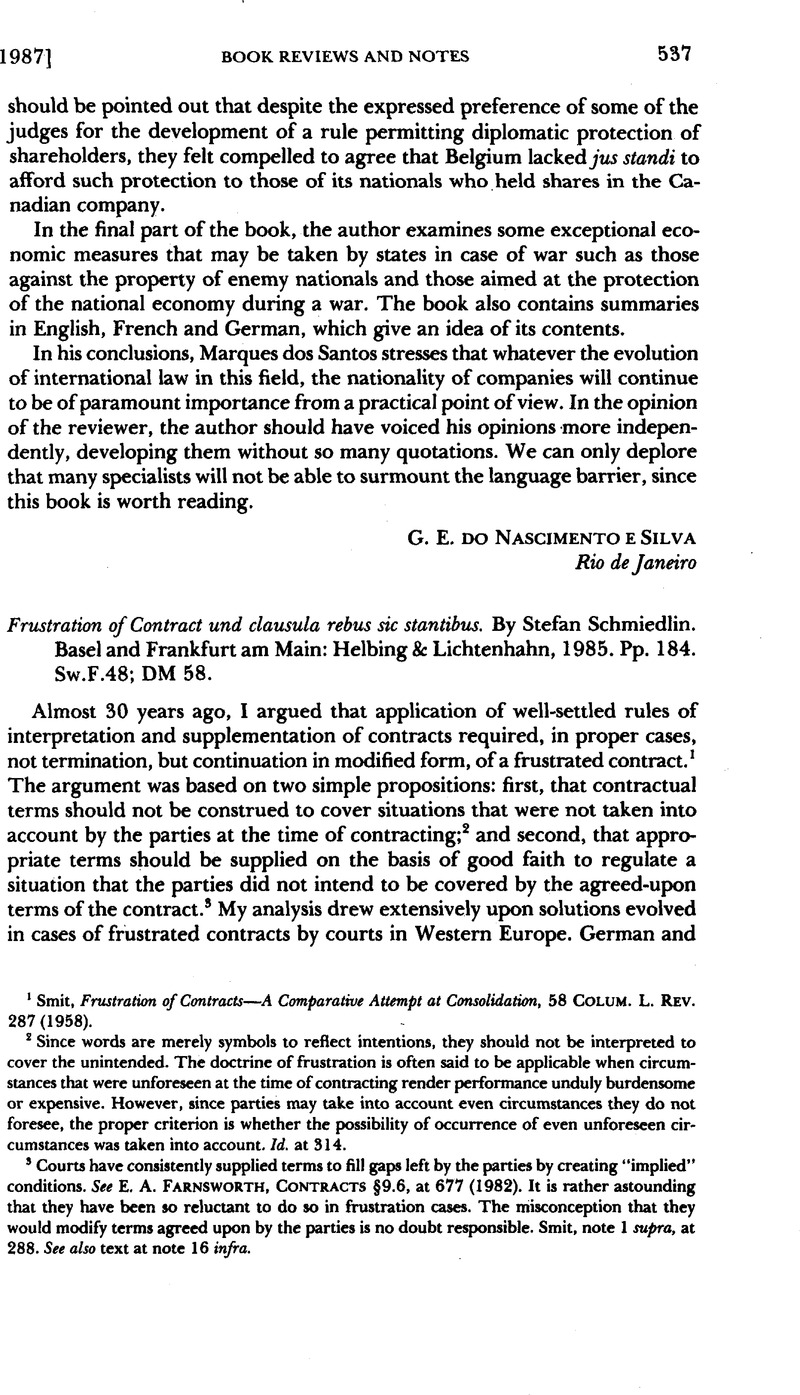No CrossRef data available.
Article contents
Frustration of Contract und clausula rebus sic stantibus. By Stefan Schmiedlin. Basel and Frankfurt am Main: Helbing & Lichtenhahn, 1985. Pp. 184. Sw.F.48; DM 58.
Published online by Cambridge University Press: 27 February 2017
Abstract

- Type
- Book Reviews and Notes
- Information
- Copyright
- Copyright © American Society of International Law 1987
References
1 Smit, , Frustration of Contracts—A Comparative Attempt at Consolidation 58 Colum. L. Rev. 287 (1958)CrossRefGoogle Scholar.
2 Since words are merely symbols to reflect intentions, they should not be interpreted to cover the unintended. The doctrine of frustration is often said to be applicable when circumstances that were unforeseen at the time of contracting render performance unduly burdensome or expensive. However, since parties may take into account even circumstances they do not foresee, the proper criterion is whether the possibility of occurrence of even unforeseen circumstances was taken into account. Id. at 314.
3 Courts have consistently supplied terms to fill gaps left by the parties by creating “implied” conditions. See Farnsworth, E. A., Contracts §9.6, at 677 (1982)Google Scholar. It is rather astounding that they have been so reluctant to do so in frustration cases. The misconception that they would modify terms agreed upon by the parties is no doubt responsible. Smit, note 1 supra, at 288. See also text at note 16 infra.
4 Smit, note 1 supra, at 296, 298–99. The new terms need not necessarily favor the party that would suffer a loss in case of performance of the original terms. A party may also invoke frustration in order to obtain a reasonable part of the anticipated advantage that performance of the original terms would bestow upon the other party. See cases cited at 296 n.66, 298–99 nn.89–90.
5 For example, the U.S. dollar recently gained and lost more than 30% of its value within the space of 1 year.
6 The world market prices of oil, coal and uranium have both risen and fallen dramatically in recent years.
7 The most cited recent American case of successful reliance on frustration in a long–term contract is Aluminum Co. of America v. Essex Group, 499 F.Supp. 53 (W.D. Pa. 1980). For recent English cases, see Schmiedlin at 60 nn.257, 260.
8 Sometimes the newspapers or trade journals afford a glimpse of what is happening in the real world. See, e.g., N.Y. Times, Jan. 8, 1985, §D, at 2.
9 See, e.g., Speidel, , Equitable Reformation of Long–Term Contracts: The New Spirit of Alcoa 1982 Utah L. Rev. 985 Google Scholar; Speidel, , Court–Imposed Price Adjustments Under Long–Term Supply Contracts, 70 Nw. U.L. Rev. 369 (1981)Google Scholar. For an excellent recent treatment of the whole subject, see Dawson, , Judicial Revision of Frustrated Contracts 64 B.U.L. Rev. 1 (1984)Google Scholar.
10 See Smit, note 1 supra, at 288.
11 See id. at 313–15.
12 Whether one party rather than the other is best situated to spread the economic burdens of the risk among the part of the public benefiting from its activities is a question to which the answer may vary from case to case. And if both parties serve a large constituency, both parties might be saddled with the risk.
13 It may be argued that the burning down of the plant is within the sphere of risks reasonably to be borne by the buyer. However, if the seller would continue to make a reasonable profit even if the contract were terminated or a lower purchase price were imposed, a good case can be made for saddling the seller with at least part of the consequences of the unanticipated occurrence.
14 Because it may generally fairly be assumed that the parties, had they taken the unanticipated event into account, would have left the risk of relatively minor fluctuations with the purchaser. See Smit, note 1 supra, at 307, 314.
15 See note 13 supra.
16 A most interesting question, not addressed in the literature, is whether the provision of new terms would be the function of the judge or that of the jury. While it might be argued that the determination of what is fair and reasonable in the circumstances should be left to the jury, which, as in determining whether someone was negligent, would impose community standards, the better view would be to leave to the judge the provision of appropriate terms required by law.




